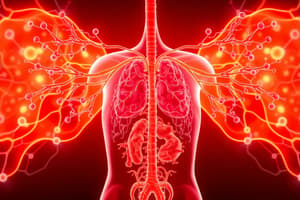Podcast
Questions and Answers
What is the primary male sex hormone responsible for the development of secondary sexual characteristics?
What is the primary male sex hormone responsible for the development of secondary sexual characteristics?
- Testosterone (correct)
- Insulin
- Growth Hormone
- Estrogen
Which gland produces growth hormone?
Which gland produces growth hormone?
- Pituitary gland (correct)
- Thyroid gland
- Adrenal gland
- Pancreas
What are hormones?
What are hormones?
- Bone structures
- Muscle fibers
- Nervous system cells
- Chemical messengers in the body (correct)
Which hormones play a crucial role in the menstrual cycle and pregnancy?
Which hormones play a crucial role in the menstrual cycle and pregnancy?
What is the function of insulin in the body?
What is the function of insulin in the body?
Which category do contraceptive methods that prevent pregnancy belong to?
Which category do contraceptive methods that prevent pregnancy belong to?
Which contraceptive method works by preventing ovulation and thickening cervical mucus?
Which contraceptive method works by preventing ovulation and thickening cervical mucus?
What is the function of hormonal implants in contraception?
What is the function of hormonal implants in contraception?
Which male reproductive organ produces a fluid component of semen?
Which male reproductive organ produces a fluid component of semen?
What is the function of the fallopian tubes in the female reproductive system?
What is the function of the fallopian tubes in the female reproductive system?
What is the role of estrogen and progesterone in the female reproductive system?
What is the role of estrogen and progesterone in the female reproductive system?
How do intrauterine devices (IUDs) prevent fertilization?
How do intrauterine devices (IUDs) prevent fertilization?
Flashcards are hidden until you start studying
Study Notes
Biology is the study of living organisms and their interactions with the environment. It encompasses a wide range of subtopics, including hormones, contraceptive methods, and reproductive organs.
Hormones
Hormones are chemical messengers produced by the endocrine system, a collection of glands and organs that secrete hormones directly into the bloodstream. They play a crucial role in regulating various physiological processes, including metabolism, growth, development, and reproduction. Hormones are produced by glands such as the pituitary, thyroid, adrenal, and pancreas, and they are transported through the bloodstream to target cells, where they bind to specific receptors and initiate a response.
Examples of Hormones
- Insulin: Produced by the pancreas, insulin regulates blood sugar levels by facilitating the uptake of glucose by cells.
- Growth Hormone: Produced by the pituitary gland, growth hormone promotes cell growth and development, particularly in children and adolescents.
- Estrogen and Progesterone: Produced by the ovaries, these hormones play a crucial role in the menstrual cycle and pregnancy.
- Testosterone: Produced by the testes, testosterone is the primary male sex hormone responsible for the development of secondary sexual characteristics.
Contraceptive Methods
Contraceptive methods are used to prevent pregnancy. They can be classified into two main categories: hormonal and non-hormonal methods.
Hormonal Methods
Hormonal contraceptives work by altering the menstrual cycle, preventing ovulation, and thickening cervical mucus to prevent sperm from reaching the egg. Examples include:
- Combined oral contraceptives (COCs): Containing estrogen and progesterone, COCs are the most commonly used hormonal contraceptives.
- Progestin-only pills (POPs): Similar to COCs, but containing only progesterone, POPs are effective even when taken irregularly.
- Hormonal patches: A patch is applied to the skin and releases hormones into the bloodstream.
- Hormonal implants: A small rod is implanted under the skin to release hormones over several years.
Non-Hormonal Methods
Non-hormonal contraceptives do not contain hormones and work by preventing fertilization or implantation of the fertilized egg. Examples include:
- Condoms: A barrier method that prevents sperm from entering the vagina.
- Diaphragms: A dome-shaped device inserted into the vagina to prevent sperm from entering.
- Spermicide: A chemical that kills sperm upon contact.
- Intrauterine devices (IUDs): T-shaped devices inserted into the vagina, IUDs prevent fertilization by altering the sperm's ability to reach the egg or by preventing implantation.
Reproductive Organs
Reproductive organs are specialized organs that play a crucial role in the production and release of gametes (sperm or eggs) and the development of offspring.
Male Reproductive Organs
- Testes: The testes produce sperm and testosterone.
- Vas deferens: A tube that carries sperm from the testes to the urethra.
- Epididymis: A coiled tube that stores and matures sperm.
- Prostate gland: A gland that produces a fluid component of semen.
- Urethra: A tube that carries semen out of the body through the penis.
Female Reproductive Organs
- Ovaries: The ovaries produce eggs and estrogen and progesterone.
- Fallopian tubes: A pair of tubes that carry eggs from the ovaries to the uterus.
- Uterus: A muscular organ that provides a site for fetal development.
- Vagina: A canal that serves as a passageway for menstrual flow, intercourse, and childbirth.
- Cervix: The lower, narrow end of the uterus that opens into the vagina.
In conclusion, biology is a fascinating field that encompasses a wide range of topics, from hormones and contraceptive methods to reproductive organs. Understanding these subtopics can provide valuable insights into human health and reproduction.
Studying That Suits You
Use AI to generate personalized quizzes and flashcards to suit your learning preferences.




